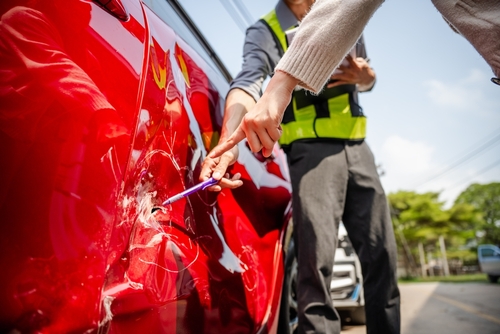Houston Streets Saw Over 300 Deaths in 2022 – Here’s What Rideshare Passengers Need to Know
More than 300 people died and nearly 1,600 were seriously injured on Houston streets in 2022, marking the first decrease in crashes since the Vision Zero Houston Plan began in 2020. While this improvement offers hope, the reality remains sobering for anyone injured in a rideshare accident. You might be wondering where you fit into these statistics and, more importantly, what your rights are if you’ve been hurt while riding in an Uber or Lyft. The complexity of rideshare insurance coverage can leave injured passengers confused about their options for recovery.
💡 Pro Tip: Document everything immediately after a rideshare accident – screenshot your ride status, take photos of the scene, and save your trip receipt. This information becomes crucial when determining which insurance policy applies to your case.
Don’t let the confusion of rideshare accident claims leave you in the lurch. Secure your well-being with the dedicated team at Payne Law Firm, ready to untangle the complexities for you. Reach out at 713-999-4801 or contact us to safeguard your rights and peace of mind.

Understanding Your Legal Rights After a Rideshare Accident in Houston
Texas law requires ride-sharing companies like Uber and Lyft to maintain insurance that covers injuries to passengers and property damage, but the coverage depends heavily on your driver’s status at the time of the crash. When you work with a rideshare accident attorney in Houston, they’ll first determine whether your driver was logged into the app and actively transporting you. Commercial coverage provided by rideshare companies generally applies when a passenger is on board from pick-up to drop-off, offering substantially more protection than during other driving periods.
The insurance landscape becomes more complicated because personal auto insurance policies specifically exclude coverage when driving for business purposes, including rideshare services. This gap in coverage can catch both drivers and passengers off guard. Your rideshare accident attorney in Houston will need to navigate multiple insurance policies – the driver’s personal insurance, the rideshare company’s commercial policy, and potentially other drivers’ policies if multiple vehicles were involved.
💡 Pro Tip: Never accept a quick settlement from any insurance company without understanding all available coverage. Rideshare accidents often involve multiple insurance policies with different coverage limits, and you may be entitled to more compensation than initially offered.
The Critical Timeline for Filing Your Rideshare Injury Claim
Time matters significantly in rideshare accident cases, and understanding the process helps ensure you don’t miss crucial deadlines. Texas law sets specific timeframes for filing claims, and rideshare cases involve unique considerations that can affect your timeline. The sooner you act, the better positioned you’ll be to preserve evidence and protect your rights.
Immediately after the accident: Report to police and seek medical attention – even minor injuries should be documented as they may worsen over time
Within 24-48 hours: Report the accident through the rideshare app and contact your own insurance company, even if they won’t cover the claim
Within one week: Gather all documentation including medical records, police reports, and witness statements
First 30 days: Critical for establishing the full extent of injuries – some rideshare insurance policies have specific notice requirements that must be met
Two-year deadline: Texas statute of limitations for filing a personal injury lawsuit – missing this deadline typically bars any recovery
💡 Pro Tip: Keep a daily journal of your pain levels, medical appointments, and how the injuries affect your daily life. This contemporaneous record often proves invaluable when demonstrating the true impact of your injuries months later.
Finding Resolution: How a Rideshare Accident Attorney in Houston Can Protect Your Recovery
Navigating the aftermath of a rideshare accident requires understanding both Texas law and the specific policies of companies like Uber and Lyft. A rideshare accident attorney in Houston can identify all available insurance coverage, which often includes layers of protection you might not realize exist. Payne Law has extensive experience handling these complex cases, understanding how to maximize recovery when multiple insurance policies apply and knowing which insurers to pursue based on the specific circumstances of your accident.
Resolution in rideshare cases typically involves negotiating with multiple insurance companies, each trying to minimize their responsibility. Your rideshare accident attorney in Houston will need to establish not just what happened, but also the driver’s exact status within the app at the time – whether they were waiting for a ride request, en route to pick up a passenger, or actively transporting you. This determination directly affects which insurance policy provides primary coverage and the limits available for your recovery.
💡 Pro Tip: Don’t give recorded statements to any insurance company before consulting with an attorney. Insurance adjusters often ask seemingly innocent questions designed to minimize your claim value.
The Real Impact: Economic and Physical Toll of Rideshare Accidents
Houston’s crash statistics reveal troubling patterns – with one person killed every 2 hours and 15 minutes on Texas roads in 2020. For rideshare passengers, these aren’t just numbers but represent real people facing mounting medical bills, lost wages, and long-term disabilities. When seeking help from a rideshare accident attorney in Houston, understanding the full scope of recoverable damages becomes essential. Beyond immediate medical costs, compensation typically includes future medical expenses, lost earning capacity, and non-economic damages like pain and suffering.
Hidden Costs Many Passengers Overlook
The true cost of a rideshare accident extends far beyond the emergency room bill. Consider ongoing physical therapy, prescription medications, and specialized medical equipment. Some injuries require lifestyle modifications – perhaps you can no longer perform certain job duties or need assistance with daily activities. Transportation Network Companies must maintain specific insurance minimums under Texas Insurance Code 1954, but these minimums may not fully cover catastrophic injuries. Understanding these coverage gaps helps explain why working with an experienced rideshare accident attorney in Houston becomes crucial for securing adequate compensation.
💡 Pro Tip: Request itemized bills from all medical providers and keep receipts for every expense related to your injury, including over-the-counter medications and medical devices. These small costs add up and are recoverable in your claim.
Insurance Coverage Gaps: What Every Rideshare Passenger Should Know
The insurance puzzle in rideshare accidents often surprises passengers who assume they’re fully protected. Most personal auto policies explicitly exclude coverage when vehicles are used for ride-sharing, creating potential gaps that can leave injured passengers vulnerable. This exclusion exists because insurance companies recognize that business use significantly increases accident risk compared to personal driving. As noted in the Uber and Lyft driver insurance guide, these gaps in coverage represent one of the biggest challenges in rideshare accident claims.
When Multiple Policies Collide
Determining liability becomes particularly complex when rideshare accidents involve multiple vehicles or when questions arise about driver fault. The rideshare company’s insurance may provide coverage, but it often works as secondary or excess coverage, only kicking in after the driver’s personal policy limits are exhausted. However, if the driver’s personal insurer denies coverage due to the commercial use exclusion, battles can ensue over which policy responds first. These scenarios can involve multiple insurers, making careful documentation of the rideshare trip status crucial for determining coverage.
💡 Pro Tip: Always verify your driver’s name and vehicle information match what’s shown in the app before getting in. This documentation proves you were a legitimate rideshare passenger entitled to the company’s insurance coverage.
Frequently Asked Questions
Common Legal Concerns After Rideshare Accidents
Many passengers injured in rideshare accidents share similar concerns about their rights and the claims process. Understanding these common issues helps you feel more confident about protecting your interests.
💡 Pro Tip: Write down your questions before meeting with an attorney. Having a prepared list ensures you don’t forget important concerns during your consultation.
Next Steps and Legal Process
The legal process following a rideshare accident typically begins with investigating coverage and liability. Your attorney will work to secure all available insurance policies while building evidence to support your claim value.
💡 Pro Tip: Start gathering your medical records and bills immediately. Having organized documentation speeds up the claims process and helps your attorney accurately value your case.
1. What if my Uber driver wasn’t logged into the app when we crashed?
If the driver was offline during the accident, claims typically must be filed with the driver’s personal auto insurance. However, most personal policies exclude rideshare driving, potentially leaving you to pursue the driver directly or explore other coverage options.
2. How much insurance coverage do rideshare companies provide in Texas?
Texas law requires Transportation Network Companies to maintain specific minimum coverage levels that vary based on the driver’s status. Coverage is highest when actively transporting passengers, but understanding these limits and whether they’ll adequately compensate your injuries requires careful analysis.
3. Can I still recover damages if I wasn’t wearing a seatbelt?
Texas follows a modified comparative negligence rule. While not wearing a seatbelt might reduce your recovery amount, it doesn’t automatically bar your claim. The key is whether your actions contributed to the severity of your injuries.
4. How long do rideshare accident settlements typically take?
Settlement timelines vary significantly based on injury severity, liability disputes, and insurance coverage issues. Simple cases might resolve in 3-6 months, while complex cases involving serious injuries or multiple parties can take 12-18 months or longer.
5. Should I accept the rideshare company’s initial settlement offer?
Initial offers rarely reflect the full value of your claim. Insurance companies often make quick, low offers hoping to close claims before you understand your injuries’ full extent. Consulting with an attorney helps ensure you’re not leaving money on the table.
Work with a Trusted Rideshare Accidents Lawyer
Rideshare accident cases involve unique legal challenges that differ significantly from standard car accident claims. The interplay between personal and commercial insurance policies, combined with evolving regulations governing Transportation Network Companies, requires thorough knowledge of both Texas state law and federal regulations. Understanding these complexities while recovering from injuries can feel overwhelming. That’s why having experienced legal representation becomes invaluable – someone who can handle the legal battles while you focus on healing.
Feeling tangled in the web of rideshare accident claims? Let Payne Law Firm guide you through the maze with clarity. Dial 713-999-4801 or contact us today to safeguard your rights and ease the journey to recovery.


